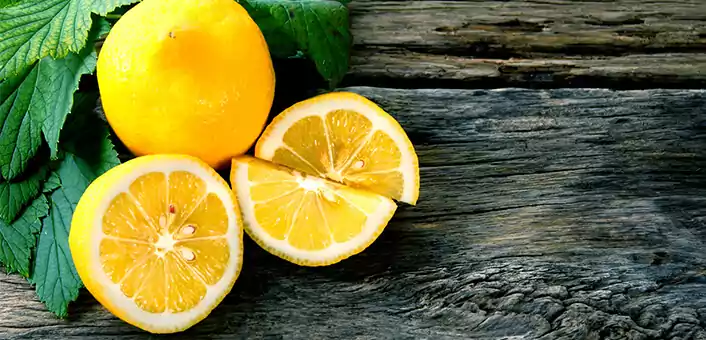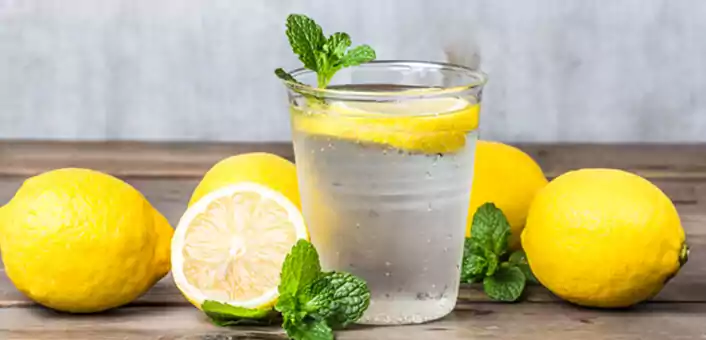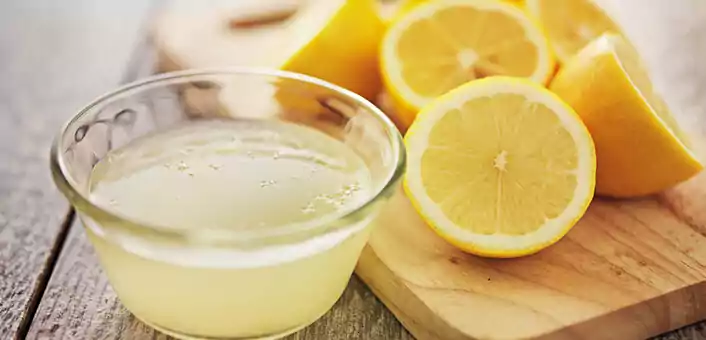
Acid Reflux
The Great Lemon Debate: Good or Bad For Acid Reflux?
Jul 7, 2017While some experts state that lemon is great for treating acid reflux, others are completely at the other end of the spectrum. Dr. Google can certainly have its advantages in finding home treatments for certain ailments, but it can be oh so confusing when you come across conflicting information about what’s good or bad for you. I noticed many stating it only makes symptoms worse due to lemon’s high acidity. Yes, lemons are highly acidic. And that’s exactly why they are good for acidity. Confused? It’s really quite simple.
Lemons Are Acidic, Stomach Needs Acid
Acid reflux is often caused because there isn’t enough acid in the stomach, where it rightfully belongs and there’s more acid in the throat, where it does NOT belong.
When we are under stress, are swallowing a bunch of pills like antibiotics or antacids, when we don’t sleep well, when we get little or no exercise, etc. we reduce our ability to produce good quality stomach acid in the right quantity. Acid is needed to break down our food and extract nutrients from it.
Unfortunately, the ‘lid’ that prevents stomach acid from sloshing up the food pipe or esophagus, shuts tight only when there is enough good quality acid in the stomach.
So, having poor stomach acid is a double whammy. Not only does it lead to poor digestion, whatever little acid is there, sloshes back up, because the stomach ‘lid’, called the Lower Esophageal Sphincter, does not shut tight. The result: acid reflux or heartburn.
So, if lime is highly acidic, and the stomach needs highly acidic acid, it makes sense that lime is good for acid reflux, right?
Lime Shots Versus Lime Juice With Water: A Slightly Tricky Choice
Pure, undiluted lime juice has a pH of around 2.5. This is a chemical measure of how acidic or alkaline a substance is. The scale goes from 1 to 14, with the more acidic a substance, the lower its pH value. At 2.5, undiluted lime juice is almost as acidic as naturally produced stomach acid, which has a pH between 1.5 to 3.
So, once again, it figures that if you want to increase stomach acid quality (which is the true cure for acid reflux in the long run), you need to have the undiluted stuff. But there’s a twist in the lime plot, because of which the nay-sayers don’t want acid reflux patients to have pure lime shots and prefer lime juice with water instead.
Acid Intolerance: When You’ve Been Refluxing Too Long
If you have been suffering from acid reflux for long, chances are, you have been having antacids for a while too. Antacids work by suppressing whatever little acid your stomach produces, so even if the stomach lid is loose, there’s nothing left to slosh up your throat. Obviously this can provide temporary relief, but cannot be a long term solution.
In fact, antacids reduce the ability of the stomach to tolerate its own acid, since the stomach is getting used to less and less acid production. This leaves the inner wall of the stomach tender. What’s more, with lesser acid, comes bacterial infections, like H Pylori, which cause ulcers. These leave the ulcerous parts of the stomach exposed and very sensitive to acid. As a result, many long-term acid reflux sufferers suffer from Acid Intolerance. To restore them back to their natural balance – where their stomach can tolerate good quality acid and make its own– a gradual process of recovery needs to be adopted.
Mixing Water With Lime: Part of the Gradual Approach To Healing Reflux
Many traditional cultures and naturopaths therefore prefer to ‘dilute’ the highly acidic lime juice with water and administer it to acid reflux patients initially. This way, they don’t ‘burn’ their stomach ulcers or their stomach inner lining, that may have gone weak and ‘acid intolerant’ over time.
As their stomach gradually gets used to the increased acidity from lime, they can transition into the more acidic pure lime shots and finally, give it all up and let their own, naturally produced, stomach acid do the job.
Lime Shots Or Lime Water: Either Is Better Than Long Term Medication
Stomach acid that travels in the wrong direction, back into the esophagus where it doesn’t belong, does serve a very important purpose within the stomach. You need stomach acid as it helps to break down the food you eat and process nutrients to distribute around the body.
When you take antacid medication, it eradicates that beneficial stomach acid and temporarily fixes your symptoms.
But what happens when you stop the body’s natural functions?
You end up with other unwanted side effects, leave yourself open to low immunity and cannot efficiently absorb nutrients. There are many studies available that express the negative effects of long-term use of antacids, including depletion of several nutrients from your body.
Lemon water, on the other hand, has shown to have many body-wide benefits:
- Lemon water reduces inflammation – New studies reveal that medication prescribed for acid reflux, work effectively to not only supress acid secretion, but reduce inflammation. When stomach acid makes its way into the esophagus, an inflammatory response is triggered. Lemons are effective in reducing inflammation (naturally without medication) due to high levels of vitamin C- a powerful antioxidant. Lemons are a great source of vitamin C.
- Aids in digestion– As studies are beginning to reveal that acid reflux could also be linked to the inability to efficiently break down carbohydrates, it makes sense to give the body a helping hand in its digestion process to eliminate painful symptoms. The enzymes found in lemon water are similar to that of your digestive juices, therefore the body notices little difference between the two and goes about its digestive tasks.
- Helps to supress hunger– Overeating is a common precursor of acid reflux but lemons contain a fiber called pectin, which leaves you with a full feeling for longer. The dieting industry has been going crazy over lemon water as an aid for weight loss because of this important fiber. As acid reflux is common in those that are overweight, this is yet another way to reduce symptoms.
Best Times To Take Lemon Shots / Lemon Water
Morning: It’s important to rehydrate as soon as you wake up as your digestive system gets a well needed flush. For this reason, you’ll notice many high authority health websites recommending lemon water when you first rise.
Before Meals: If you’re someone trying to get your stomach acidity and digestive fire up with lemon shots and don’t have ulcers or a tender stomach, having a lime shot just before a meal is the way naturopaths suggest you go. If you prefer the lemon water, sipping it during a meal can likely help. If you’re a little guilty of having eyes too big for your stomach, sipping lemon water during meals is a great way to help you eat less.
How Much to Take?
Starting with a weak dilution of lemon juice squeezed into fresh water is the best approach, especially if your body is not used to the intake of lemons. Use 1tsp diluted in half a glass of water and increase the dose over time to a few tsps. If you’re starting with lemon shots (again, please read the warnings earlier in this article), you want to start with the undiluted juice of half a lemon and then move up to the juice of a whole lemon.
Possible side effects: If taken in excess, a laxative effect may occur due to the active pectin fiber. The best approach is to monitor the effects of each food you consume to recognize what triggers your symptoms. Last warning: If you are a veteran of acid reflux and have been using antacids for more than a month, DON’T start with lime shots. It could give you a nasty acid rebound. Go slow with lime water instead or Involve a naturopathic practitioner to help you work the lime juice into your life.
Drinking lemon water is just one effective change that you can make to combat your acid reflux symptoms. Overall lifestyle changes will bring about the most positive outcomes such as limiting processed foods while increasing whole foods and staying active to maintain a healthy body weight.
References:
A very low-carbohydrate diet improves gastroesophageal reflux and its symptoms
https://www.ncbi.nlm.nih.gov/pubmed/16871438
Lemon Polyphenols Suppress Diet-induced Obesity by Up-Regulation of mRNA Levels of the Enzymes Involved in β-Oxidation in Mouse White Adipose Tissue https://www.ncbi.nlm.nih.gov/pmc/articles/PMC2581754/
Lemons- World’s Healthiest Foods http://www.whfoods.com/genpage.php?pfriendly=1&tname=foodspice&dbid=27
Association of Acute Gastroesophageal Reflux Disease With Esophageal Histologic Changes – Inflammation and Acid Reflux http://jamanetwork.com/journals/jama/fullarticle/2521970
Weight Loss Can Lead to Resolution of Gastroesophageal Reflux Disease Symptoms: A Prospective Intervention Trial https://www.ncbi.nlm.nih.gov/pmc/articles/PMC3853378/
Grow Youthful- Healthy at any age- David Miller Book
http://www.growyouthful.com/comment-ailment-remedy.php?remedyNo=44&ailmentNo=9
Effects of long term use of antacids https://www.fda.gov/Drugs/DrugSafety/InformationbyDrugClass/ucm213259.htm






